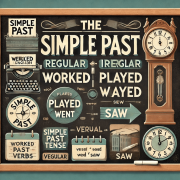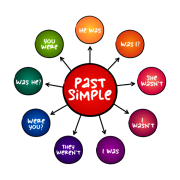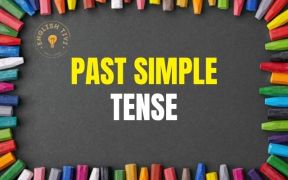Différences entre versions de « Simple Past »
| Ligne 244 : | Ligne 244 : | ||
= {{Widget:Liens-enseignement-Fiche}} = | = {{Widget:Liens-enseignement-Fiche}} = | ||
| − | == {{Widget:Idées ou Réflexions liées à son enseignement-Fiche}} == | + | == {{Widget:Idées ou Réflexions liées à son enseignement-Fiche}} == |
| + | <!-- ************** Début Fiche Didactique Idées-Enseignement ******************--> | ||
| + | {{Fiche Didactique Idées-Enseignement <!------------------------------------------> | ||
| + | <!-- Espace de réflexions, stratégies, astuces ou d'idées pour l'Enseignement lié à cette thématique --> | ||
| + | |Idées-Enseignement= <!-- ---------------------------------------------------- --> | ||
| + | <!-- Complétez les pointillés et Supprimez les lignes non utilisées -----> | ||
| + | <!-- ****************** Commencez les modifications ************************** --> | ||
| − | + | * [[Using storytelling to reinforce past tense usage]]: | |
| − | + | :* Have students write and share short stories about their previous vacations or memorable events, focusing on using [[ the Simple Past]]. | |
| − | |||
| − | |||
| − | |||
| − | |||
| − | * .... | + | * [[Incorporating visuals and time markers]]: |
| − | :* ... | + | :* Use pictures or timelines to help students visualize the sequence of events and understand the correct use of time markers (e.g., yesterday, last year, two days ago) to set the context for [[ the Simple Past]]. |
| − | * | + | |
| − | :* . | + | * [[Role-playing activities for real-life practice]]: |
| + | :* Engage students in role-playing exercises where they talk about past experiences, such as describing a visit to a museum or recounting a memorable moment from a past event. | ||
| + | |||
| + | * [[Games to practice verb conjugations]]: | ||
| + | :* Create interactive games (e.g., verb conjugation bingo or flashcards) where students match base verbs with their correct past tense forms. | ||
| + | |||
| + | * [[Peer review for error correction]]: | ||
| + | :* Have students work in pairs to review each other’s written work, focusing on identifying and correcting errors in the use of [[ the Simple Past]] tense. | ||
}}<!-- ************************* Fin Idées-Enseignement ********************** --> | }}<!-- ************************* Fin Idées-Enseignement ********************** --> | ||
Version actuelle datée du 20 novembre 2024 à 12:58
 Traduction
Traduction
Passé simple (Français) / Simple past (Anglais) / الماضي البسيط (Arabe) / Pretérito simple (Espagnol) / Passado simples (Portugais) / Простое прошедшее время (Russe) / Passato semplice (Italien) / Präteritum (Allemand) / 一般过去时 (Chinois (Mandarin)) / साधारण भूतकाल (Hindi) / 単純過去 (Japonais) / সরল অতীত কাল (Bengali) / Past simpel (Néerlandais) / Simples passado (Grec)
 Définition
Définition
Domaine, Discipline, Thématique
Définition écrite
- The simple past (or past simple) tense in English is used to describe actions or events that were completed in the past. It is essential for indicating that an action occurred at a specific point in time, often specified with time markers like *yesterday*, *last week*, *in 2020*, or *two days ago*.
Affirmative Form:
- For regular verbs, the simple past is formed by adding -ed to the base form of the verb (e.g., *worked*, *played*).
- Irregular verbs, however, have unique past forms (e.g., *went*, *saw*).
Negative Form:
- The negative form uses the auxiliary verb did not (or *didn’t*) followed by the base form of the main verb (e.g., *did not work*, *didn't go*).
Interrogative Form:
- Questions in the simple past begin with Did, followed by the subject and the base form of the main verb (e.g., *Did you work?*, *Did he go?*).
This tense is widely used in English to narrate past events, describe historical facts, and provide background for actions completed at specific times in the past.
|
Applications and Nuances of the Simple Past
1. Completed Actions in the Past: The simple past describes actions that took place at a specific moment in the past, with no connection to the present. Example: “*She visited London last year.*” 2. Past Habits: It can describe repetitive actions or habits in the past, often with expressions like *always*, *often*, *never*. Example: “*They always walked to school.*” 3. Narratives and Sequences of Events: This tense is often used in narratives to describe a series of actions in chronological order, providing structure to the storyline. Example: “*He entered the room, turned on the light, and sat down.*” 4. Hypotheticals or Unreal Conditions in Conditional Sentences: In conditional type 2 sentences, the simple past is used to indicate hypothetical or unreal situations. Example: “*If I had more time, I would travel more.*” 5. Specific or Extended Events: The simple past can indicate singular events (e.g., “*I saw him yesterday*”) or prolonged states that lasted in the past (e.g., “*They lived in France for ten years*”). |
Définition graphique
 Concepts ou notions associés
Concepts ou notions associés
 Exemples, applications, utilisations
Exemples, applications, utilisations
|
* Illustrating completed actions in a historical timeframe: *Example*: *She visited Paris last summer.* *Rationale*: This use highlights events that occurred and concluded at a specific time in the past. * Structuring narrative discourse through sequences: *Example*: *He woke up early, prepared breakfast, and left for work.* *Rationale*: This function is pivotal in storytelling to establish a chronological flow of events. * Depicting habitual practices or recurring behaviors in the past: *Example*: *They always played football after school.* *Rationale*: This emphasizes regular activities or patterns that existed in a prior temporal context. * Situating actions within specified temporal parameters: *Example*: *I met him in 2018.* *Rationale*: This application anchors an action to a defined point in time for clarity and precision. * Employing time expressions to frame temporal specificity: *Example*: *We arrived two hours ago.* *Rationale*: This demonstrates how time markers enhance the contextual understanding of past actions. * Constructing negations to invalidate past occurrences: *Example*: *She did not (didn't) attend the meeting yesterday.* *Rationale*: This use allows for the expression of events that definitively did not take place. * Eliciting information about past events through inquiry: *Example*: *Did you see the movie last night?* *Rationale*: This structure facilitates the retrieval of specific information regarding past actions. |
 Erreurs ou confusions éventuelles
Erreurs ou confusions éventuelles
![]() Examples of common difficulties in understanding or interpreting:
Examples of common difficulties in understanding or interpreting:
- Difficulty identifying whether an action is complete or ongoing in the past.
- Misunderstanding time markers like *ago, yesterday, last week*.
![]() Potential confusions or semantic shifts:
Potential confusions or semantic shifts:
- Confusion between Simple Past - Present Perfect
*I saw this movie . *I have seen this movie.
- Confusion between Regular - Irregular verbs.
*I goed* instead of *I went
- Using the base verb instead of the past tense.
*She go to the park* instead of *She went to the park
- Incorrect negation with *did not.
*She didn’t went* instead of *She didn’t go.
- Overuse of time markers inappropriately:
*Yesterday I have finished my homework instead of Yesterday I finished my homework.
 Questions possibles
Questions possibles
- What are the primary uses of the Simple Past tense?
- How do regular and irregular verbs differ in the Simple Past?
- What are some common time markers associated with the Simple Past?
- How do you form negative sentences in the Simple Past??
- What is the difference between the Simple Past and the Present Perfect?
- How do you ask questions using the Simple Past tense?
 Liaisons enseignements et programmes
Liaisons enseignements et programmes
Idées ou Réflexions liées à son enseignement
- Have students write and share short stories about their previous vacations or memorable events, focusing on using the Simple Past.
- Use pictures or timelines to help students visualize the sequence of events and understand the correct use of time markers (e.g., yesterday, last year, two days ago) to set the context for the Simple Past.
- Engage students in role-playing exercises where they talk about past experiences, such as describing a visit to a museum or recounting a memorable moment from a past event.
- Create interactive games (e.g., verb conjugation bingo or flashcards) where students match base verbs with their correct past tense forms.
- Have students work in pairs to review each other’s written work, focusing on identifying and correcting errors in the use of the Simple Past tense.
Education: Autres liens, sites ou portails
 Bibliographie
Bibliographie
Pour citer cette page: (Past)
ABROUGUI, M & al, 2024. Simple Past. In Didaquest [en ligne]. <http:www.didaquest.org/wiki/Simple_Past>, consulté le 21, novembre, 2024
- ..................
- ..................
- ..................
- ..................
- Pages utilisant des arguments dupliqués dans les appels de modèle
- Sponsors Education
- Grammaire (Concepts)
- Linguistique (Concepts)
- Apprentissage des langues (Concepts)
- Anglais (Concepts)
- Conjugaison (Concepts)
- Phonétique (Concepts)
- Rédaction en anglais (Concepts)
- Compréhension écrite (Concepts)
- Expression orale (Concepts)
- Tense usage (Concepts)
- Past Actions
- Time Markers
- Regular Verbs
- Irregular Verbs
- Completed Events
- Narratives
- Past Routines
- Affirmative Form
- Negative Form
- Interrogative Form
- Concepts
- Simple Past
- Simple Past (Concepts)
- Fiche conceptuelle didactique





